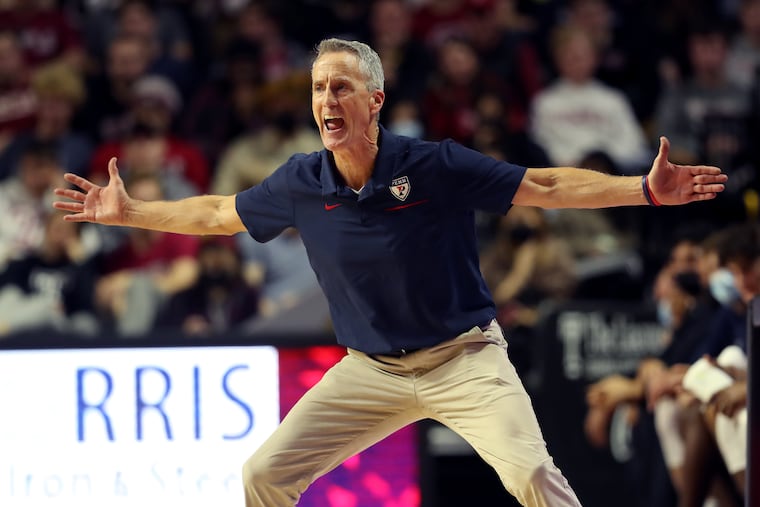The Ivy League messes with its own basketball tradition | Mike Jensen
The Ivy League spread out its schedule, so it's not all back-to-back games. But why? It’s not like the Ivies have added or lost schools. It’s the same eight it’s always been.

A big win for the Penn Quakers Friday night up in Cambridge. The Quakers knocked off Harvard, Jordan Dingle scoring 31 points. So what would they do Saturday night at Dartmouth? A Harvard win doesn’t mean as much if it’s coupled with a Dartmouth loss.
Wait a second, there was no Dartmouth loss, because there was no Dartmouth game … because the Ancient Eight has messed with a traditional rite of Ivy hoops passage.
The tradition was simple. Each school had a playing partner. Penn and Princeton, for instance. Those schools played all their home and road Ivy games, men and women, on Friday and Saturday nights. Harvard one night, Dartmouth the next. Or vice versa. Yale, then Brown. Columbia, then Cornell. Or Cornell, then Columbia. The biggest variable was when you played your travel partner.
» READ MORE: Jordan Dingle scores 31 to lift Penn over Harvard, 78-74
Until this season. Now, welcome to the new Ivy age of little rhyme, whatever the reason. In Penn’s case: Play at Harvard on a Friday … wait a week for another game. Head back up 358 miles to Dartmouth on Feb. 26, the Southern-most school in the league heading to the Northern-most for a one-off. (Same deal for Dartmouth and Harvard heading South. Penn and Princeton became separate trips.)
The Ivies messed with something so, so simple. Not easy, the back-to-backs, but simple and fair.
We hate this change …
Take that back. We’re not passionate enough about it to use the word hate.
We’re discombobulated by it.
For the record, we’re not into tradition just for tradition’s sake. Unlike many Ivy purist types, we like the four-team Ivy League playoff. We even approve of moving the tournament around, despite the Palestra being the obvious perfect home, way above the rest. (Too much Penn advantage, sorry Quakers.)
But this? Why? It’s not like the Ivies have added or lost schools. It’s the same eight it’s always been.
» READ MORE: Penn athletics to allow spectators again starting on Tuesday
Those back-to-backs are not completely gone. Penn, currently third in the league, still has two road weekends … still heading for Columbia this Friday, then slogging up to Cornell Saturday. Still have a Yale-Brown trip. But that means competitive factors are actually more in play. Cornell has its act together this season, contending for one of those four playoff spots. So is it fair for Penn to play Cornell on zero rest while Brown, another playoff contender, plays the game as a one-off?
It’s my understanding that the back-to-backs originated because Harvard and Princeton used to have their final exams after Christmas, while others had them before. That limited the available dates in January, so the Friday-Saturday games solved that problem, squeezing the whole schedule into a shorter time frame.
Except Harvard and more recently Princeton moved their exams up, so coaches looked around and wondered why all the games were stuffed into the shorter window.
Fair enough. Except if everyone didn’t like the back-to-backs, switch it to Friday and Sunday. The old America East used to do that forever, and, if memory serves, would schedule the Sunday games in the early afternoon so teams could get back to campus at a reasonable time.
» READ MORE: Amy Mallon earned her Drexel success in true Philly style
That was studied by the Ivy League, we’re told, with four weekends of Friday-Sunday games, and four other weekends including one weekend game. Sounds clean. Except some coaches didn’t want to play on Sundays. This was a coaches-up, not a presidents-down type of process. It’s officially a two-year “pilot” program.
Penn coach Steve Donahue doesn’t want to throw shade at his own league product, but Donahue did say the unbalanced schedule, which had Penn playing a bunch of home games, and now a bunch of road games, isn’t perfect.
“If you’re away for 23 days, your students can forget you have a team,” Donahue said.
» READ MORE: It will take more than a stroke to suppress Joe Mihalich’s basketball expertise
And if you have four home games in a row, “sometimes they can get tired of you” – meaning, tired of getting to all the games bunched up, when there is competition for their time.
That isn’t just hypothetical. Penn played four home games in 13 days to start the Ivy season. You could argue that allowed the Quakers to gain a little confidence before heading out on the road. They won three of the four, the loss being the one game that seemed easiest on paper, to Columbia, while the Quakers beat Yale, the conference favorite.
There still is a commitment to Friday and Saturday games – no Ivy games during the week for Penn except the game at Princeton, which was on a Monday. (That all sounds slightly high and mighty for the Ivies, not taking away from class time, when no such consideration is given to nonconference games in November and December. Penn, for instance, has played games on every day of the week. Maybe Ivy players just take all their tougher courses in the spring semester.)
» READ MORE: When Kobe was held scoreless for the summer, and other stories I learned from ‘The Rise’
Does Donahue have to prepare a little differently now for this changed schedule?
“Yeah, I think so, for sure,” Donahue said. “That’s fine. I get that. There’s a different rhythm to the season.”
The good news, by the end, everybody will play everybody else twice, home and road. Most wrinkles will sort themselves out. The top four, men and women, will get to the Ivy playoff.
Now we just have to remember where that is this year.